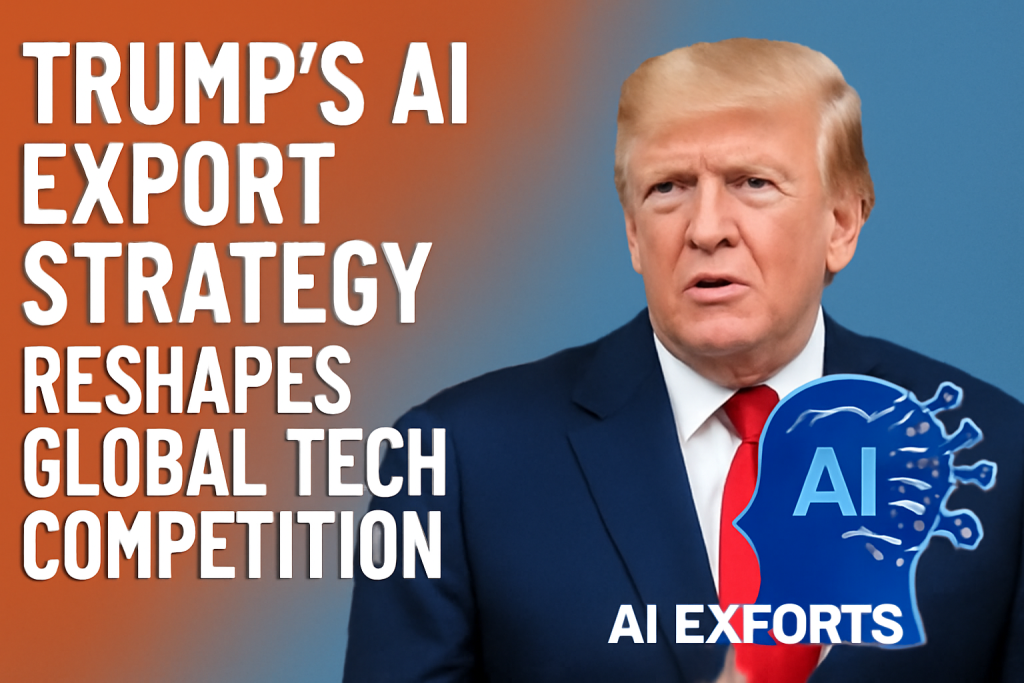President Trump announced a sweeping AI export strategy that positions American companies for global expansion. The 23 July executive order creates clear competitive advantages for US firms. It also addresses critical security gaps exposed by billion-dollar chip smuggling operations.
Why This Strategy Matters Now
The global AI market presents massive opportunities for American companies. Trump’s plan gives US firms priority access to federal financing tools. It also creates structured pathways to export comprehensive AI solutions worldwide.
The Department of Commerce must establish the new export program within 90 days. Companies can propose full-stack AI packages including hardware, software, and applications. Selected proposals receive priority status and government backing.
This approach directly counters China’s aggressive AI expansion efforts. Recent reports show Nvidia’s advanced B200 processors worth over $1 billion reached Chinese markets illegally. The chips appeared on black markets despite strict US export controls.
How It Solves Key Export Challenges
The strategy addresses two critical business problems. First, it streamlines complex export processes for allied nations. Second, it strengthens enforcement against unauthorized technology transfers.
The State Department will coordinate unified federal support for AI exports. This includes removing technical barriers and regulatory obstacles. Partner countries will receive help creating pro-innovation environments for US AI systems.
For enforcement, the plan recommends creative new approaches. These include location verification features on advanced AI chips. The government will also monitor emerging technologies to prevent diversion to restricted countries.
Market Impact for US Companies
American AI companies gain significant competitive advantages under this framework. Priority financing access reduces barriers to international expansion. Government diplomatic support opens new markets previously difficult to enter.
The program targets specific countries and regional blocs for engagement. Industry consortia can propose comprehensive export packages. Each proposal must identify target markets and comply with all US regulations.
Small businesses receive special attention through coordinated SBA support. This creates opportunities for innovative startups to participate in global AI deployment. The approach builds a broader ecosystem beyond major tech giants.
Addressing the Smuggling Crisis
Illegal chip exports have reached alarming levels. Chinese distributors from multiple provinces sold restricted Nvidia processors including B200, H100, and H200 models. Southeast Asian countries became transit points for these unauthorized transfers.
Nvidia responded that building datacenters with smuggled products creates technical and financial problems. The company provides service and support only for authorized products. However, Chinese buyers reportedly pay 50 per cent premiums for black market chips.
The new strategy proposes stronger controls on semiconductor manufacturing subsystems. It also encourages allies to adopt complementary protection systems. Secondary tariffs and foreign direct product rules will ensure international alignment.
What Business Leaders Should Know
This policy shift creates immediate opportunities for strategic planning. Companies should evaluate their AI export potential under the new framework. Early participation in the Commerce Department program could provide significant advantages.
The 90-day implementation timeline means rapid action is essential. Industry consortia must prepare detailed proposals including target markets and compliance frameworks. Government evaluation will prioritize comprehensive, well-structured submissions.
Companies already operating in allied markets gain preferential positioning. The strategy emphasizes partnerships with like-minded nations. This creates natural advantages for firms with established international relationships.
The enforcement provisions also require attention from compliance teams. Location verification technologies will become standard requirements. Companies must prepare for enhanced monitoring of their global supply chains.
Strategic Implications
This initiative represents a fundamental shift in US technology policy. It moves beyond simple export restrictions to proactive market engagement. American companies gain government backing for international AI deployment.
The approach recognizes that technology leadership requires both innovation and strategic distribution. By supporting allies while blocking adversaries, the US aims to shape global AI development patterns.
Success will depend on rapid implementation and industry participation. The Commerce Department’s 90-day deadline creates urgency for all stakeholders. Companies that act quickly may secure lasting competitive advantages in the evolving global AI landscape.
The strategy also signals long-term US commitment to maintaining technological supremacy. This provides confidence for companies planning major AI investments and international expansion efforts.


